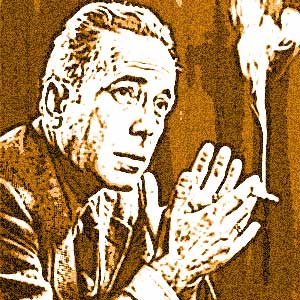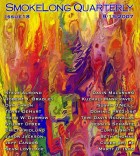What role does Bachon play in the narrator’s life? What purpose does she serve within the community?
Ah, well, I like to leave that up to each reader. Her role, as far as I can tell, could be to give the narrator an excuse to act as a catalyst for his desires. Or it could be she really does communicate with him telepathically and has slowly driven him mad. As for her purpose in the community—sadly, not much. She’s based on a woman I walked by every day after I left work. She sat on the front steps of a rather shabby tenement house and did what Bachon does: drink beer, make strange noises, etc. Children would ride by on bikes and make fun of her, which made me feel bad for her until I realized she seemed to enjoy it in a way. It was the only time I ever saw her smile. And it was the creepiest, most chilling smile I’d ever witnessed.
Your writing pays a lot of attention to the senses. The narrator doesn’t get the delivery job because he smells like beer and old socks. Bachon smells stew. She can taste when he makes the stew with liver. Her tongue looks like a pink crayon. The beer is polluted brown. What is your favorite sense? Which one is underutilized in writing?
The sense of smell is the one that stands out for me. One slight whiff of something can bring back a load of memories—both good and bad. I don’t think any one sense is underutilized, but I do believe the sense of sight is over-utilized by writers sometimes. Reading in gory detail what something looks like can be fairly boring after a while.
“The stripper girls are getting off work soon. The children will see them, too, and Bachon knows. She knows there is meat out there.” Why this ending?
Ha-ha. I’ve been asked that a few times. I wanted the reader to determine if Bachon was calling the shots or getting the blame. I was told by a reader the ending was weak because it didn’t have a definite conclusion. I took that as a compliment. If one person out there has to stop, think and create their own ending, I feel I’ve accomplished something. After all, nothing horrifies or scares us more than our own imaginations.
Tell us about the Turtle Mountain Band of the Ojibwe, of which you are a member.
Not an easy question. I was given up for adoption when I was an infant because I look white. My parents thought I’d have a shot at a better life. This was in 1958, and things were somewhat different then. My birth family and I got back in touch in 1989, but I’d always felt something inside. It’s hard to describe—not to mention, it sounds hokey. Anyway, I was amazed when I went and visited them and discovered all my so-called “different” traits had a foundation. I’m proud of my heritage, but like religion, it’s a very personal thing to me. I’ve managed to pass that pride onto my children, and that, to me, is wonderful.
Since this is my first issue with SLQ, I thought it’d be appropriate to discuss firsts. Writing firsts. First time you called yourself a writer, first publication, first check. Those sorts of things. So, dish. What is your most memorable writing first?
I never called myself a writer until recently, although I remember the first time someone referred to me as one. He was my biggest supporter, so it meant a lot. Unfortunately, he passed away, but not a day goes by when I’m writing that I don’t stop to remember him and how he encouraged me. I think a lot of writers can appreciate how we’re not taken very seriously. Telling someone you’re a writer is usually akin to telling people you want to grow up to be a fairy princess. I do have one important person in my life who is very supportive, and a big thank you to him.
My most memorable writing first came on February 5, 2006. I’m a huge Pittsburgh Steelers fan, and they won the Super Bowl that night. I signed onto my email account to rub the noses of friends who were Seahawks fans in it and found out I’d won the Writers Choice Award on EditRed, a writing site I’d recently joined. Not that I’m counting on it, but if the day comes when I receive a major writing award, I don’t think it could ever compare to that first time something I wrote won notice.
And the first check is one thing I think every writer never forgets. I have the copy of mine framed and hanging where I see it every day. The money may be infrequent, but it’s the knowledge I’ve entertained someone that makes me smile.
Thanks for this opportunity and my sincerest appreciation to the staff and guest editor Mary Miller on this, my first appearance in SmokeLong Quarterly.



 The core workshop of SmokeLong Fitness is all in writing, so you can take part from anywhere at anytime. We are excited about creating a supportive, consistent and structured environment for flash writers to work on their craft in a community. We are thrilled and proud to say that our workshop participants have won, placed, or been listed in every major flash competition. Community works.
The core workshop of SmokeLong Fitness is all in writing, so you can take part from anywhere at anytime. We are excited about creating a supportive, consistent and structured environment for flash writers to work on their craft in a community. We are thrilled and proud to say that our workshop participants have won, placed, or been listed in every major flash competition. Community works.